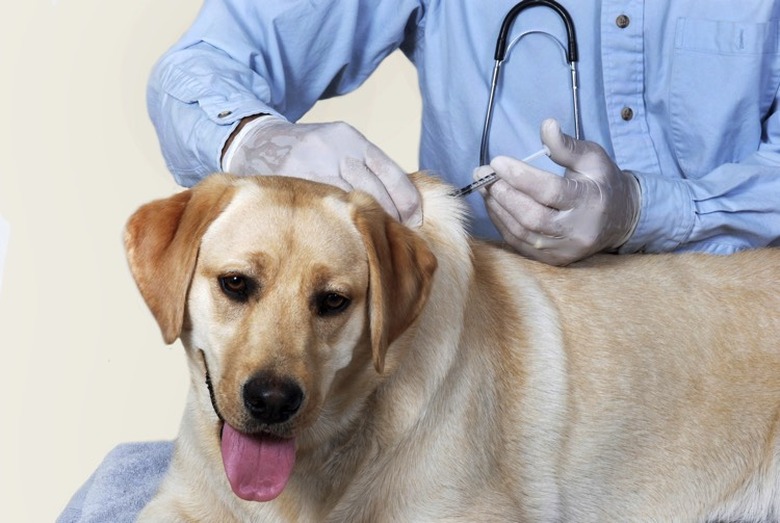Canine Bordetella Vaccine Schedule
Vaccines are meant to prevent illness and disease in your dog, but the effects aren't permanent. Your dog must receive boosters on a regular schedule to remain protected. The recommended schedule for Bordetella vaccinations depends on whether it is the first dose or a booster, your dogs level of risk and his health.
Kennel Cough
Kennel cough, formally known as Bordetella bronchiseptica, is a bacterial upper respiratory infection that causes a deep, hacking cough in dogs and other animals. The common name kennel cough refers to the fact that it is often spread in kennels, where close quarters allow the bacteria to easily pass from dog to dog. The infection is usually uncomfortable, but not life-threatening in healthy dogs, but can turn into pneumonia in animals with weak immune systems. Bordetella vaccine is the preventive against this illness. It is not one of the core vaccines routinely administered to puppies and adult dogs, like rabies, distemper, parvo and adenovirus vaccine. It is usually required, however, if your dog is staying at a boarding facility, groomer or overnight at a veterinarian's office.
Initial Vaccination
If the initial vaccination is intranasal, or squirted into the nose, only one initial dose is required. If the vaccine is injected, however, the initial dose should be followed up by a second one in two to four weeks. Regardless of the administration method, your dog should be vaccinated at least one week, but preferably two weeks, before he faces possible exposure at a boarding facility or event. Puppies can receive their first Bordetella vaccination at 8 weeks of age.
Boosters
Although the recommended schedule for core vaccines such as parvo, distemper and adenovirus has changed from a booster once per year to once every three years, recommendations for Bordetella remain the same. Healthy dogs who are boarded or visit the groomer occasionally should receive a Bordetella booster once per year. Dogs and puppies at high risk for contracting the illness should receive a booster every six months. Dogs at high risk include those who frequently attend shows and events, spend large amounts of time in a kennel or at a groomer or have a weakened immune system. Consult with your vet to determine whether your dog needs a booster on an annual or bi-annual schedule.
Special Considerations
Dogs who have a low risk of contracting kennel cough, such as those who are not normally taken to a groomer, boarding facility, dog park, pet store or dog-related events may not necessarily need to be vaccinated against it. Or, they may only need to be vaccinated prior to such an event and not on a regular basis. If your dog's risk is low, discuss the pros and cons with your veterinarian to determine if your dog should be on a regular schedule or receive the vaccine only on an as-needed basis.
By Carlye Jones
References
Mercola Healthy Pets: Good News About the Latest Canine Vaccination Guidelines
Animal Planet: Kennel Cough and Bordetella
All Pets Veterinary Hospital: Pet Vaccination Guidelines
About the Author
Carlye Jones is a journalist, writer, photographer, novelist and artisan jeweler with more than 20 years of experience. She enjoys sharing her expertise on home improvements, photography, crafting, business and travel. Her work has appeared both in print and on numerous websites.
